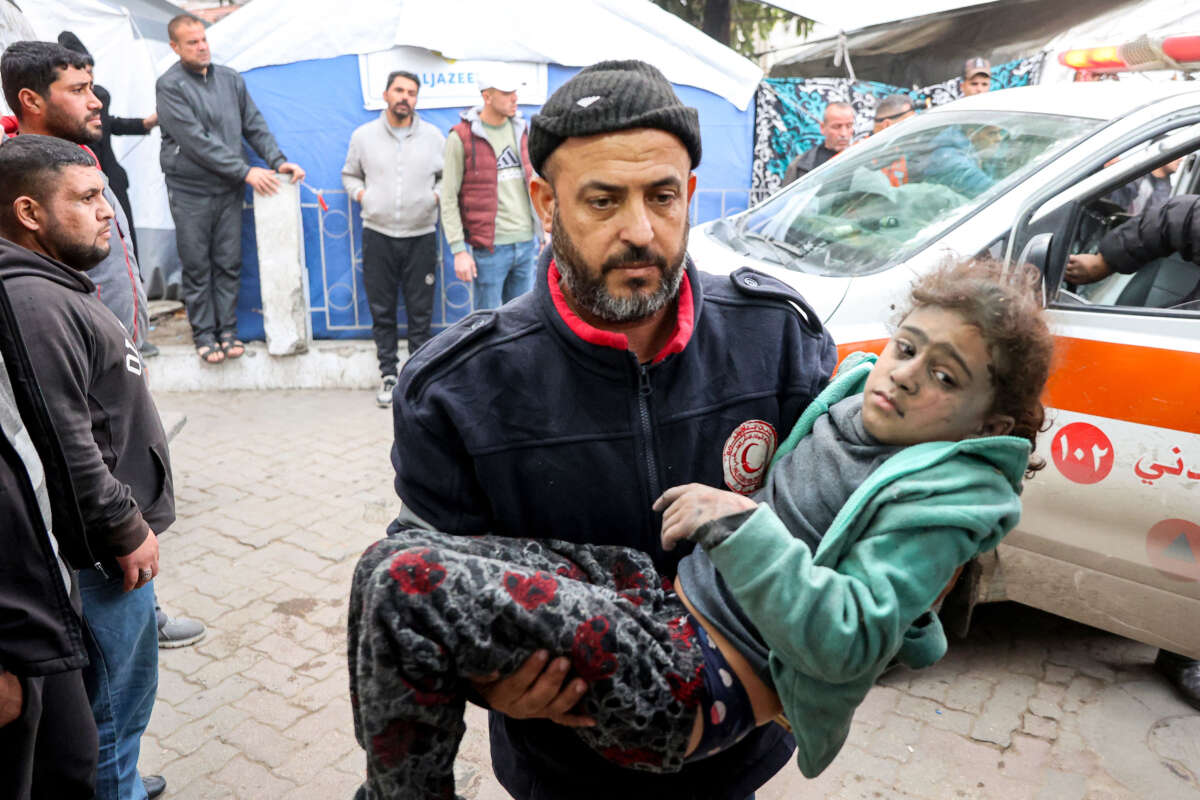Hospitals across the Gaza Strip are at imminent risk of shutdown or have already been forced to reduce operations as they run out of fuel due to Israel’s near-total blockade of fuel across the strip, officials and human rights groups have warned.
Gaza health officials warned this week that all of the remaining hospitals in the besieged enclave no longer have any fuel reserves to operate electrical generators. Rather, hospitals are receiving a trickle of fuel, only enough to run parts of their facilities for hours, or a day at most.
The UN says that the lack of fuel reserves is “placing the lives of patients and newborns at grave risk.” The Gaza Ministry of Health has said that a patient has already died due to a lack of fuel for kidney dialysis machines.
The fuel crisis comes just after Israeli forces raided, destroyed and evacuated all three remaining hospitals in northern Gaza — Kamal Adwan, Indonesian and Al-Awda — leaving the region without any medical care.
Two southern Gaza hospitals, European Hospital and Nasser Hospital, have already said this week that they would soon have to stop the functioning of some or all of their departments due to the lack of fuel reserves; on Wednesday, Nasser said that the complex had to stop all of its operations, with only enough fuel to keep a small generator operational for three hours.
Médecins Sans Frontières (MSF) said on Wednesday that the shutdown of Nasser will endanger the lives of 22 children, including 19 newborns, who are dependent on electricity generation to survive. The group said that their teams are transferring fuel to the facility as a last-ditch effort, but that this solution will only buy providers and their patients 36 to 48 hours.
“Without fuel, these newborns are at risk of losing their lives,” MSF emergency coordinator Pascale Coissard said. “They are already in an extremely vulnerable state, and any transfer to other hospitals would directly endanger their lives. Putting the lives of children at risk like this is unacceptable and is a consequence of Israel’s ongoing blockade and continuous criminal looting of lifesaving supplies.”
Health officials and humanitarian aid workers have pleaded for international intervention in Israel’s humanitarian aid blockade, raising alarm that a shutdown of hospitals across the Strip will cause untold amounts of death. However, Israeli forces have continued their near-total blockade, not just blocking aid from entering but also enabling looting gangs to seize aid bound for those most in need, officials have said.
“The [Israeli] occupation forces aid convoys, including fuel trucks, to take roads filled with thieves and bandits to steal them under its protection,” the Gaza Ministry of Health said in a statement.
The fuel shortages are already having impacts. Health providers have said that they are being forced to ration care and choose between which patients to treat. Al Jazeera reports that hospitals will soon turn into “graveyards for wounded and sick Palestinians” without immediate intervention. One doctor at Al-Aqsa has said that there are no longer ICU beds anywhere in Gaza due to the blockade of fuel, shortage of medical supplies and attacks by Israeli forces.
The official death toll from Israel’s genocide surpassed 46,000 people on Thursday, though experts have said that the true toll is likely far higher. Crucially, officials only count deaths reported through health facilities as part of the official count, while deaths due to causes like illness are often excluded from the toll.
Angry, shocked, overwhelmed? Take action: Support independent media.
We’ve borne witness to a chaotic first few months in Trump’s presidency.
Over the last months, each executive order has delivered shock and bewilderment — a core part of a strategy to make the right-wing turn feel inevitable and overwhelming. But, as organizer Sandra Avalos implored us to remember in Truthout last November, “Together, we are more powerful than Trump.”
Indeed, the Trump administration is pushing through executive orders, but — as we’ve reported at Truthout — many are in legal limbo and face court challenges from unions and civil rights groups. Efforts to quash anti-racist teaching and DEI programs are stalled by education faculty, staff, and students refusing to comply. And communities across the country are coming together to raise the alarm on ICE raids, inform neighbors of their civil rights, and protect each other in moving shows of solidarity.
It will be a long fight ahead. And as nonprofit movement media, Truthout plans to be there documenting and uplifting resistance.
As we undertake this life-sustaining work, we appeal for your support. Please, if you find value in what we do, join our community of sustainers by making a monthly or one-time gift.
